Edition: 18 to 29 November 2024
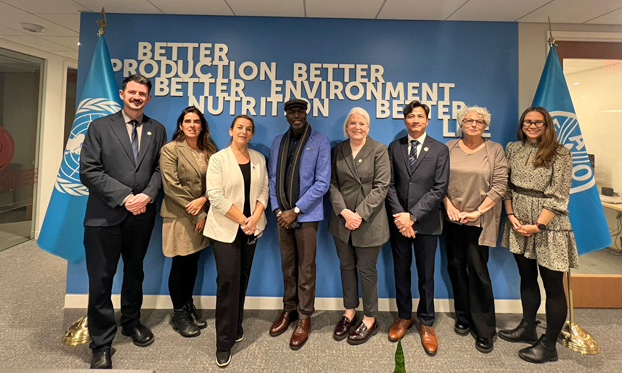 © FAO/Karine Garnier | ASIA AND THE PACIFIC Celebrating 20 years of partnership with USAID in Washington, DC FAO ECTAD celebrated two decades of advancing global health security from 18 to 21 November 2024 with a series of high-profile discussions in Washington, DC, the United States, focusing on One Health, pandemic preparedness and antimicrobial resistance. The US Center for Strategic and International Studies (CSIS), in collaboration with the FAO Liaison Office for North America (LOW), organized a series of events that included a public panel discussion and a private roundtable session. These sessions were attended by representatives from US government agencies and international organizations. Discussions emphasized FAO's contributions to One Health, emergency response and global health security. Side meetings with key US Government partners explored areas for collaboration on global health security, including antimicrobial resistance and pandemic preparedness, highlighting FAO ECTAD’s impact on animal health and resilience globally. |
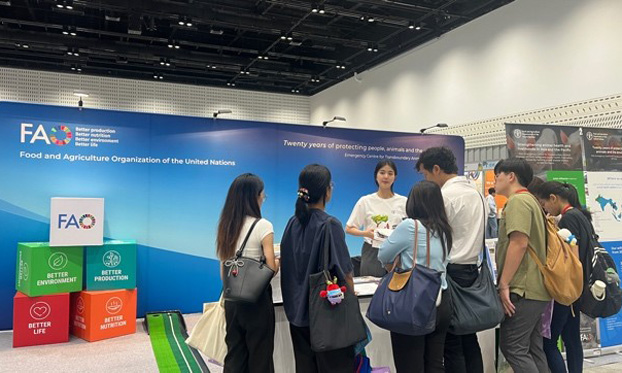 © FAO/Rindu Putri | ASIA AND THE PACIFIC Twenty years on display: FAO ECTAD booth spotlights awareness at international conference FAO participated in the International Conference on Veterinary Science (ICVS) 2024, from 28 to 29 November, showcasing two decades of ECTAD’s achievements in protecting people, animals and the environment. The interactive booth highlighted FAO’s efforts to reduce AMR, strengthen animal health systems and promote One Health. Participants explored success stories, innovations and collaborative initiatives with key partners. |
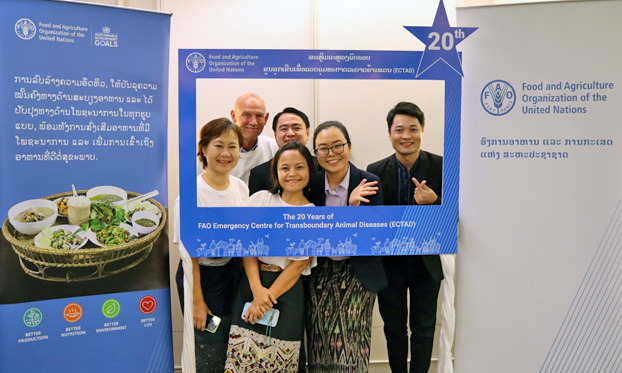 © FAO/Bounmee Maokhamphiou | LAO PEOPLE'S DEMOCRATIC REPUBLIC Celebrating FAO ECTAD’s 20 years impact on animal health and food security FAO celebrated two decades of partnership with the Department of Livestock and Fisheries in Lao People's Democratic Republic on 22 November. The event highlighted achievements in controlling animal health threats, strengthening food systems and ensuring a healthier future. Key successes were made possible through support from USAID, the United States Defense Threat Reduction Agency (DTRA), Republic of Korea’s Ministry of Agriculture, Food and Rural Affairs (MAFRA), UKAid and the Fleming Fund, enabling advancements in surveillance, laboratory capacities and biosecurity at farm and community levels. Read the news here. |
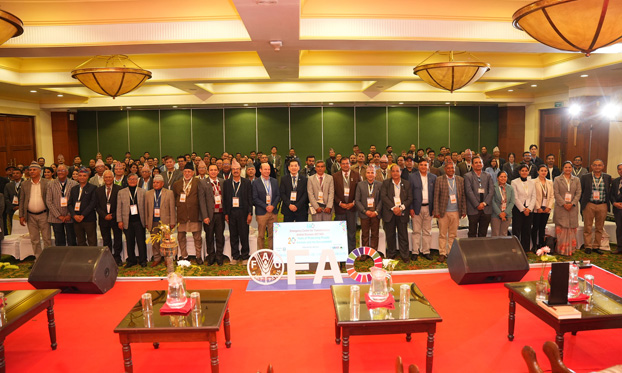 © FAO/Suman Giri | NEPAL Nepal marks 20 years of FAO ECTAD success FAO organized an event in Kathmandu to celebrate two decades of the ECTAD programme in strengthening Nepal’s animal health systems on 29 November. Honorable Agriculture Minister Ramnath Adhikari joined senior government officials, partners and long-standing resource partner USAID Nepal to commemorate the milestone. Attendees honored winners of three anniversary-related competitions and discussed FAO ECTAD’s achievements, as well as future plans to enhance animal health systems in the country. |
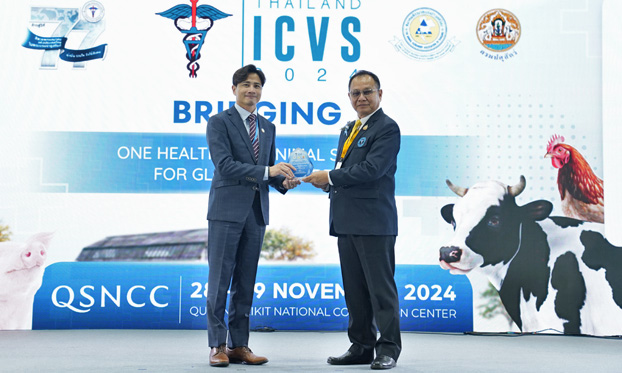 © FAO/Rindu Putri | ASIA AND THE PACIFIC FAO engages at the International Conference on Veterinary Science 2024 FAO actively participated in the 46th International Conference on Veterinary Science (ICVS) 2024, held at the Queen Sirikit National Convention Center in Thailand from 28 to 29 November. As part of the collaboration, FAO organized a regional consultation on animal disease surveillance in Asia and the Pacific to encourage knowledge exchange and expertise sharing among 74 regional participants. FAO also hosted an exhibition booth highlighting its initiatives in advancing animal health and One Health, aligned with the 20th anniversary of ECTAD. Organizers recognized FAO’s contributions to veterinary science and regional collaboration. The events were made possible with technical and financial support from the United States Agency for International Development and Defense Threat Reduction Agency. |
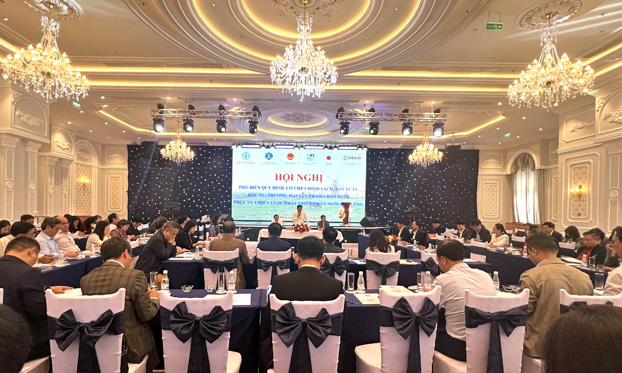 © FAO/Pawin Padungtod | VIET NAM Strengthening livestock policies for sustainable development FAO and the International Finance Corporation supported Viet Nam's Department of Livestock Production in hosting a national conference in Lam Dong province on 29 November. Funded by USAID, the event focused on disseminating new livestock policies under the livestock production strategy and gathering provincial feedback on their implementation. Key updates included Decree 106/2024/ND-CP and Circular 18/2023/TT-BNNPTNT. The conference engaged 95 participants from 41 provinces and 20 organizations. |
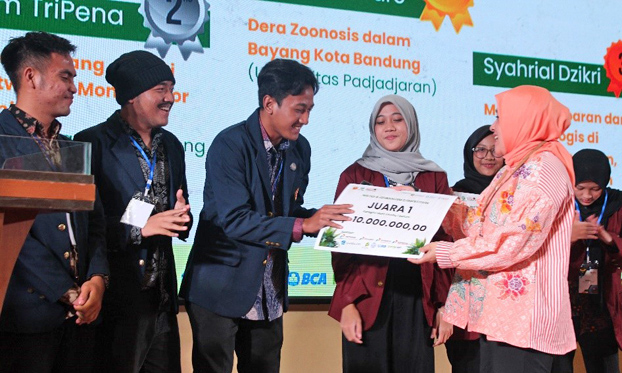 © Padjadjaran University | INDONESIA Wildlife Journalism Competition 2024 The Wildlife Journalism Competition 2024 concluded with an award ceremony at Padjadjaran University, Indonesia, on 28 November. Organized by the Center for Environmental Communication Studies in partnership with FAO and with financial support from USAID, the event celebrated young journalists advancing environmental health and conservation awareness. Seminars and talks explored themes such as the benefits of forests and wildlife conservation. Winners in feature writing, documentary video and photo story categories showcased impactful works inspiring action for Indonesia’s environmental conservation. Read the news here. |
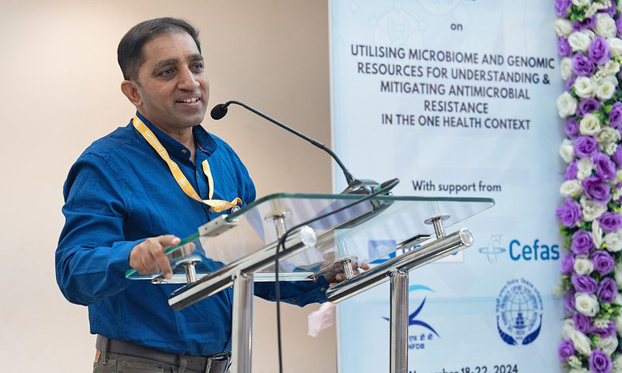 © FAO/Robin Paul | INDIA FAO participates in NITTE University workshop FAO’s Technical Officer for AMR and Laboratories, Robin Paul, took part in an inaugural workshop at NITTE University on utilizing microbiome and genomic resources for understanding and mitigating AMR in the One Health context. Held on 18 November, the session was organized in collaboration with the Indian Council of Agricultural Research (ICAR), the United Kingdom’s Centre for Environment, Fisheries, and Aquaculture Science and the United States’ University of Mississippi. The session focused on genomic strategies and laboratory capabilities to address AMR in fisheries, emphasizing interdisciplinary collaboration in research and policy development. |
Learn more about our work on partnerships here. | |
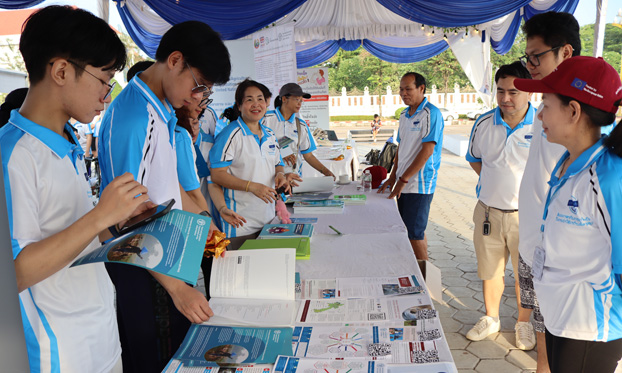 © FAO/Bounmee Maokhamphiou | LAO PEOPLE'S DEMOCRATIC REPUBLIC Vientiane antimicrobial resistance walk highlights global threat to health
In a show of solidarity, over 500 participants from various ministries and stakeholders gathered in Vientiane to walk around Patuxay Monument for World AMR Awareness Week (WAAW). Hosted by the Ministries of Agriculture, Health, and Environment, and supported by FAO, World Health Organization (WHO), UK International Development and the Fleming Fund, the event highlighted the urgent global threat of drug-resistant infections. Vice-Minister of Health Phaivanh Keopaseuth emphasized the need to confront this pressing public health crisis as Laos unites against superbugs. Read the news here. |
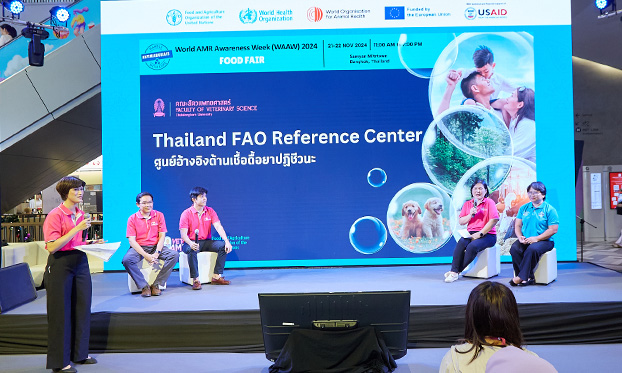 © FAO | ASIA AND THE PACIFIC Regional food fair showcases AMR-conscious choices
The regional offices of FAO, WHO and the World Organisation for Animal Health (WOAH) hosted the WAAW Food Fair in Bangkok on 21-22 November, with support from the European Union and the United States Agency for International Development (USAID). This event brought together consumers, experts and food producers to promote antimicrobial resistance (AMR)-conscious food products and practices. The fair featured live-streamed sessions, engaging talk shows and free samples including sale of antimicrobial-free products. This year’s event also featured the 20th anniversary of the Emergency Centre for Transboundary Animal Diseases (ECTAD), a flagship FAO programme. For two decades, ECTAD has led efforts to combat transboundary animal diseases, safeguard health and ensure global food security, highlighting its commitment to preventing disease outbreaks and fostering international collaboration to protect both animal and human health. Read the news here. |
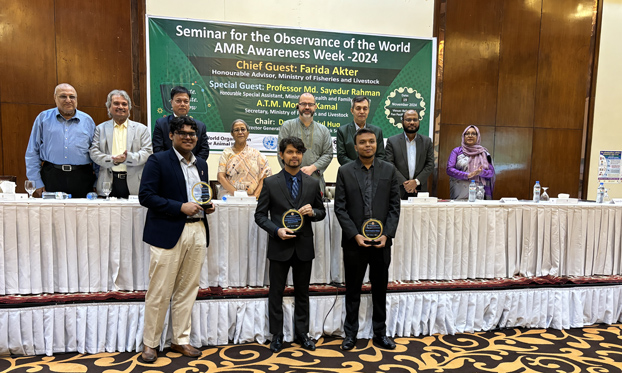 © FAO/Humayra Nowrin | BANGLADESH AMR videos and One Health actions take the spotlight
The Quadripartite organizations (FAO, the United Nations Environment Programme (UNEP), WHO and WOAH) joined the governments from the animal health, environment and human health sectors on 19 November to celebrate WAAW under the theme "Educate. Advocate. Act Now." The event highlighted the contributions of four winners from the AMR video competition organized by FAO, who were awarded crests and a screening of their winning entries. Presentations provided insights into the current status of AMR, emphasizing the need for unified One Health action. |
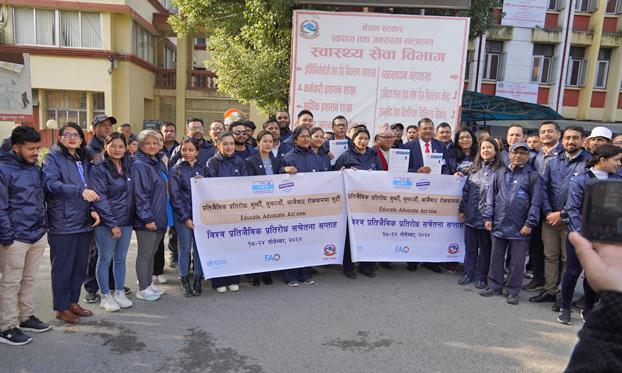 © FAO/Suman Giri | NEPAL Joint rally drives AMR plan forward
FAO, through USAID funding, collaborated with WHO and other multi-sectoral partners to support the Government of Nepal in commemorating WAAW 2024. On 18 November, a joint rally in Kathmandu brought together 250 professionals from the human health, animal health, agriculture and food sectors. The rally commenced at the Department of Livestock Services (DLS) and culminated at the Department of Health Services (DoHS), where the Director-General of DoHS formally handed over the recently endorsed National Action Plan on Antimicrobial Resistance (NAP AMR) to Director-General of DLS. |
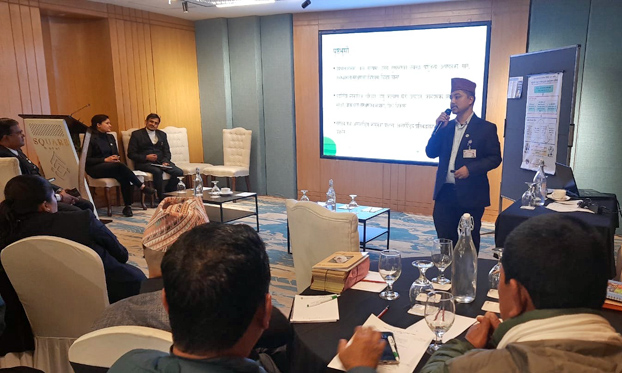 © FAO/Sambriddhi Nepal | NEPAL Orientation training on good husbandry practices and rational use of antimicrobials for pig farmers
FAO and DLS, funded by the Pandemic Fund, conducted an orientation session on good husbandry practices and the rational use of antimicrobials for pig farmers. Held on 28 November in Kathmandu, the session engaged 25 pig farm proprietors and farmers from across the country. Participants were introduced to the recently endorsed good husbandry practices directive and learned practical ways to implement it on their farms. They also received guidance on AMR and biosecurity, along with related informational materials. |
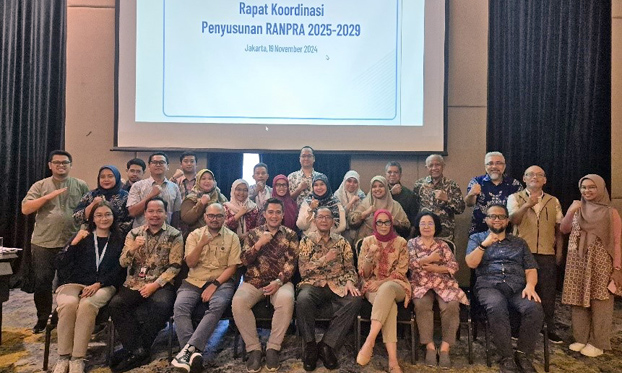 © FAO/Cresensia Hadiyanti | INDONESIA Multisectoral meeting for developing the 2025-2029 National Action Plan on AMR
The Coordinating Ministry for Human Development and Cultural Affairs (CMHDCA), as chair of the national AMR control steering committee, previously conducted monitoring and evaluation of the 2020-2024 National Action Plan for Antimicrobial Resistance (NAP AMR). This assessment identified key strengths, weaknesses and recommendations for the next plan. On 19 November, FAO, CMHDCA and the drafting team held a follow-up meeting to begin developing the first chapter of the 2025-2029 NAP AMR document. The chapter will cover situation analysis, global, regional, and national policies, long-term goals and target users. |
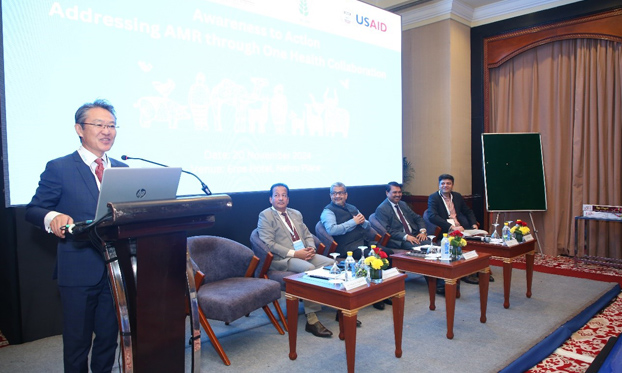 © FAO/Owaisy Bushra | INDIA AMR stakeholders meeting shapes India’s future strategy
On 20 November, FAO and the Department of Animal Husbandry and Dairying, with financial support from USAID, organized a multisectoral AMR workshop in Delhi to mark WAAW 2024. More than 50 participants—government officials, private sector representatives, veterinary professionals, food safety experts and environmental scientists—joined panel discussions focused on using a One Health approach to address AMR. Insights from these discussions will help shape the upcoming NAP AMR 2.0 and promote stronger cross-sectoral collaboration. |
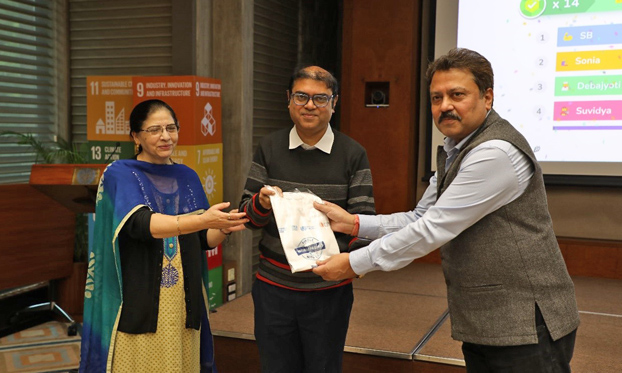 © FAO/Dipesh Solanki | INDIA AMR team enhances awareness among FAO staff
On 22 November, FAO ECTAD organized an awareness session for over 30 FAO staff as part of WAAW 2024, supported by USAID. The event provided an overview of the AMR situation in India, highlighting key challenges and strategies for mitigation. It also emphasized the importance of policy dialogue within the health sector. The session featured a quiz competition, promoting dynamic engagement and awareness among participants. |
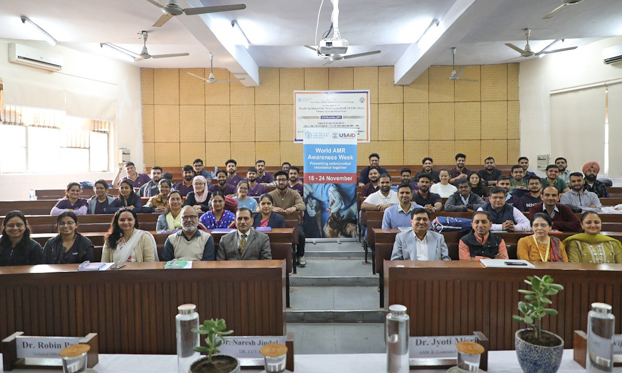 © FAO/Owaisy Bushra | INDIA AMR workshops empower veterinary and fisheries students
Funded by USAID, FAO organized AMR awareness workshops at Lala Lajpat Rai University of Veterinary and Animal Sciences and Kerala University of Fisheries and Ocean Studies from 21 to 22 November. The workshops educated students on AMR risks across animal health, fisheries, agriculture, and human health, emphasizing the One Health approach. Over 80 veterinary students participated in each session, which featured group activities and interactive quizzes to encourage actionable steps in reducing antimicrobial usage in livestock, poultry and fisheries. |
Learn more about our work on AMR here.
| |
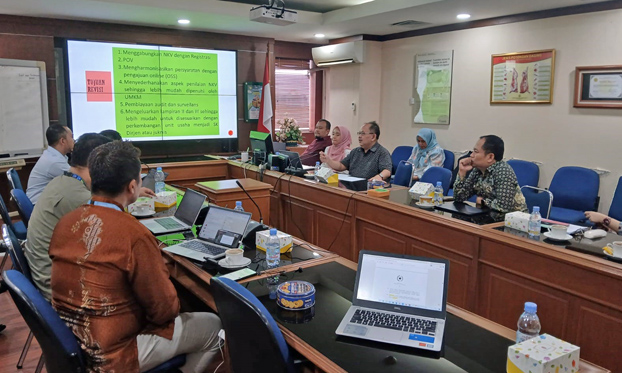 © fao/Erianto Nugroho | INDONESIA Revision of official regulation concerning certification of veterinary control numbers On 26 November, FAO, in partnership with Indonesia’s Directorate General of Livestock and Animal Health Services (DGLAHS) and USAID, convened a meeting to finalize updates to Ministry of Agriculture Regulation No. 11/2020 on Veterinary Control Numbers for animal product business units. The regulation aims to enhance animal product safety and quality by addressing contamination risks from zoonotic diseases and AMR. Discussions included streamlining certification guidelines and animal product registration procedures to improve biosecurity and infection prevention measures.
|
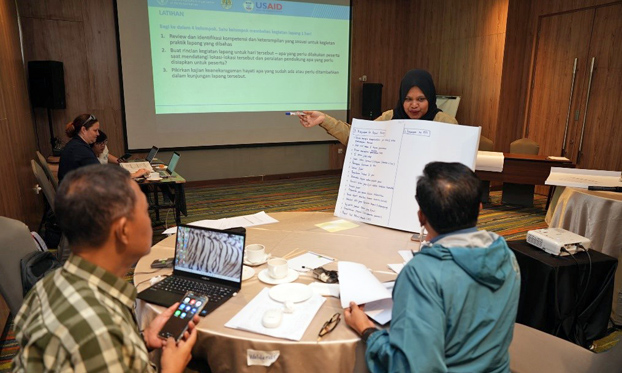 © fao/Eko Prianto | INDONESIA World’s first field training programme for wildlife health to combat zoonoses FAO collaborated with Indonesia’s Ministry of Forestry to conduct a training of trainers and training of mentors for the Field Training Programme for Wildlife, Environment, Biodiversity and Ecosystems (FTP-WEBE) in Bogor from 18 to 21 November. Funded by USAID, this pioneering programme introduces a novel approach to disease prevention and control in the wildlife sector, strengthening Indonesia’s resilience against zoonotic disease spillovers and addressing gaps in specialized training for environmental and wildlife professionals.
|
Learn more about our work on capacity development here.
| |
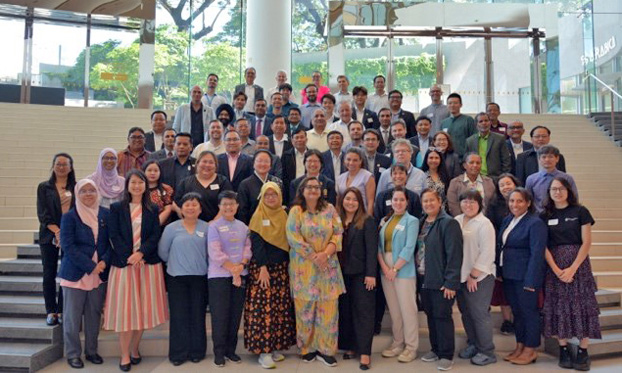 © FAO/Rindu Putri | ASIA AND THE PACIFIC Strengthening animal disease surveillance through regional collaboration A regional consultation was held from 26 to 28 November in Bangkok, Thailand, aimed at enhancing collaborative approaches for disease surveillance and early warning in the Asia-Pacific region. Supported by DTRA and USAID, the event brought together 74 participants from 12 countries, along with regional and global partners. Attendees reviewed common gaps, explored innovative approaches and identified key follow-up actions. The workshop also developed a collaborative matrix to strengthen surveillance systems and capacities. Follow-up actions were agreed upon with participating countries reporting progress through established networks and FAO pledging to facilitate coordination and organize a follow-up workshop within a year to assess progress and refine strategies.
|
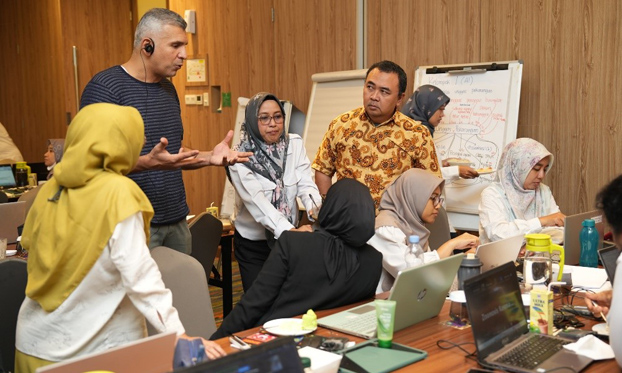 © FAO/Eko Prianto | INDONESIA Training on risk-based surveillance planning, operationalization and review tool FAO and Indonesia’s Ministry of Agriculture, with financial support from USAID, conducted training on the Risk-based Surveillance Planning, Operationalization and Review Tool (Risk SPORT) in Bogor from 18 to 22 November. Risk SPORT supports countries in strengthening risk-based surveillance plans by integrating data from One Health stakeholders, including spatial, temporal and species-specific risk factors. The training offered hands-on experience, enhancing surveillance of zoonotic and non-zoonotic diseases while improving cost-effectiveness across surveillance programmes.
|
| Learn more about our work on surveillance here. | |
 © FAO/Sital Kaji Shrestha | NEPAL Laboratory clinical interface workshops for animal health professionals
With support from USAID, FAO assisted DLS in organizing six laboratory-clinical interface workshops across Nepal. These sessions engaged 22 agrovet entrepreneurs, 45 veterinarians and 91 veterinary technicians across multiple districts, aiming to raise awareness about Nepal's current animal disease status and address AMR trends observed in veterinary laboratories nationwide. Organized with Central Veterinary Laboratory, Veterinary Laboratory Pokhara and Veterinary Laboratory Surkhet, the initiative strengthened links between clinical practice and laboratory diagnostics, empowering animal health professionals to respond more effectively to emerging challenges. |
Learn more about our work on capacity development of laboratories here.
| |
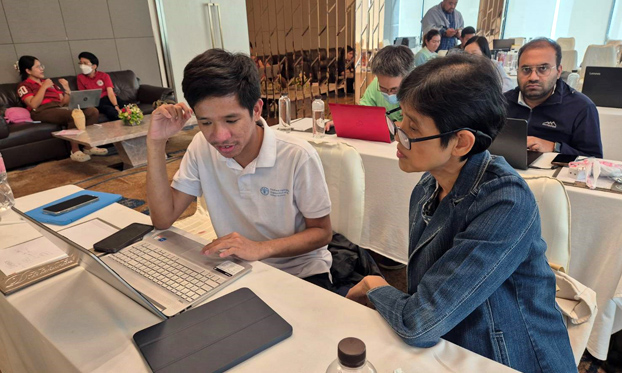 © FAO/RFETPV | ASIA AND THE PACIFIC R-FETPV trainees advance towards graduation with second training module
With support from DTRA and USAID, the final training course for the 12-month second module of the Regional Field Epidemiology Training Programme for veterinarians (R-FETPV) began on 18 November in Bangkok, Thailand. This module emphasizes outbreak investigation, combining two face-to-face courses with nine months of field practice to conduct two investigations. Trainees from Thailand, the Philippines and Indonesia are enhancing skills in advanced spatial analysis and programming through a two-week course, alongside individual mentoring to finalize their studies. The module will culminate in field practice presentations at the R-FETPV Scientific Conference from 2 to 4 December, celebrating the completion of their year-long training module. |
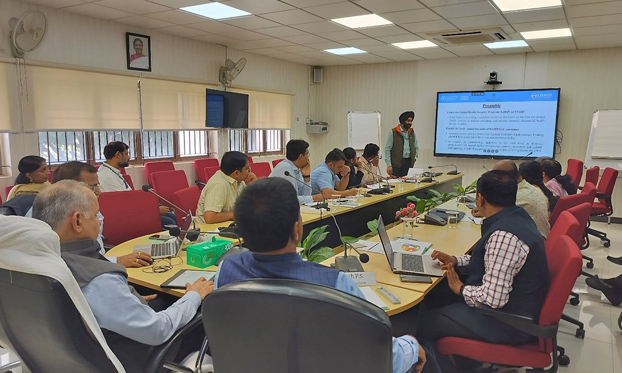 © FAO/Vikram Vashist | INDIA Training of trainers workshop for veterinary epidemiologists
FAO, in collaboration with India’s Department of Animal Husbandry and Dairying (DAHD) and ICAR-National Institute of Veterinary Epidemiology and Disease Informatics, is set to launch a frontline in-service applied veterinary epidemiology training (ISAVET) programme. This initiative aims to strengthen the epidemiology workforce among field veterinarians across the country. With support from USAID, a two-day orientation and training of trainers workshop, held from 21 to 22 November, brought together 20 participants who will serve as master trainers to implement the programme effectively. |
Learn more about our work on epidemiology here.
| |
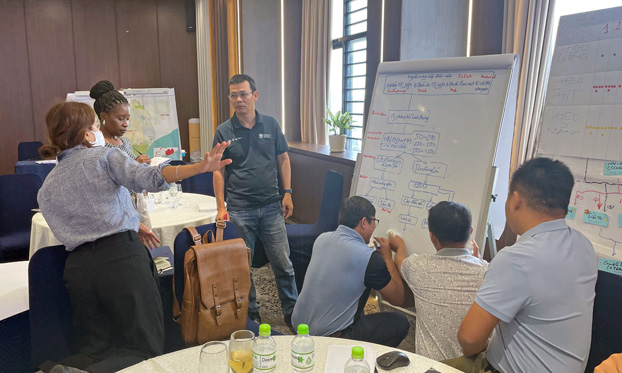 © FAO/Pawin Padungtod | VIET NAM Strengthening biosecurity and risk mitigation in Viet Nam’s pig subsector using a value chain approach
FAO and Viet Nam’s Department of Livestock Production assessed the pig value chain to identify risks and design sustainable disease mitigation strategies from 20 to 22 November. Supported by United States Department of Agriculture - Animal and Plant Health Inspection Service, this initiative integrates value chain analysis into the FAO Progressive Management Pathway for Terrestrial Animal Biosecurity framework. The approach fosters public-private collaboration to enhance biosecurity, improve animal health and productivity, safeguard human health, and protect ecosystems—key for Viet Nam’s expanding pig sector. |
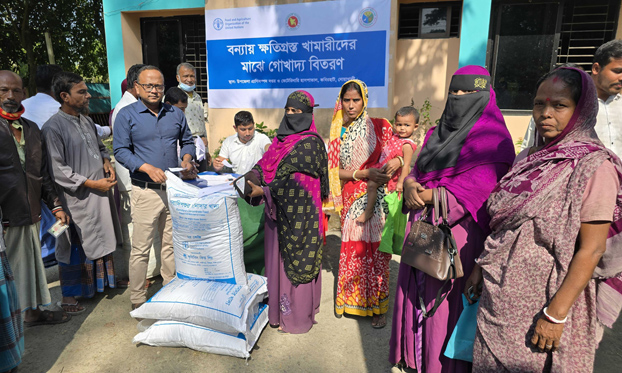 © FAO/Humayra Nowrin | BANGLADESH Supporting flood-affected livestock farmers
FAO, in collaboration with the Department of Livestock Services, provided 926.7 metric tons of cattle feed to 12 356 flood-affected small-scale farmers across 50 upazilas in Chattogram, Sylhet and Khulna divisions of Bangladesh. Funded by FAO, the initiative aims to provide critical support to livestock communities. The feed was distributed by the Upazila Livestock Office and Veterinary Hospital. The recent floods severely impacted the northeastern and southeastern regions, with feed shortages identified as a major challenge for cattle farmers. |
Learn more about our work on risk mitigation here.
| |
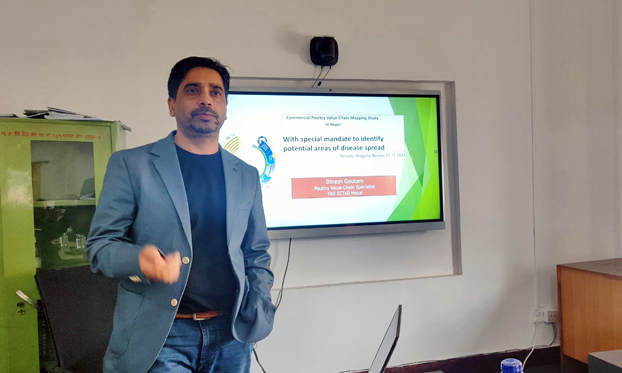 © FAO/Surendra Karki | NEPAL Pig and poultry value chain study meeting
FAO, with funding from the Pandemic Fund, supported DLS to conduct a pig and poultry value chain study meeting on 22 November in Lalitpur. The objective of this meeting was to brief the high-level government officials of DLS, Central Veterinary Laboratory and other relevant stakeholders on methodologies regarding pig value chain mapping study in the country and to deliver the findings from the key informants of the ongoing poultry value chain study. These studies will help in identifying the disease transmission risk across the pig and poultry value chain in Nepal ultimately leading to evidence-based policy formation across the pig and poultry value chain. |
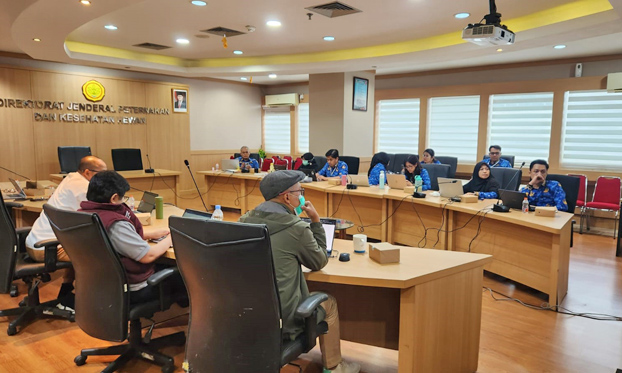 © FAO/Andri Jatikusumah | INDONESIA Workshop on risk mapping methodology for updating the regulation on non-natural disaster risks
With financial support from USAID, FAO and Indonesia’s Ministry of Agriculture (MoA) organized a workshop on risk mapping to support the revision of National Disaster Management Authority Regulation No. 2/2012 from 28 to 29 November 2024. Participants included staff from the DGLAHS and the Coordinating Ministry of Human Development and Cultural Affairs. The workshop provided technical recommendations for structured guidelines on risk identification and disease risk assessment, resulting in an updated draft regulation to improve preparedness for zoonotic disease outbreaks. |
Learn more about our work on risk reduction along the value chain here.
| |
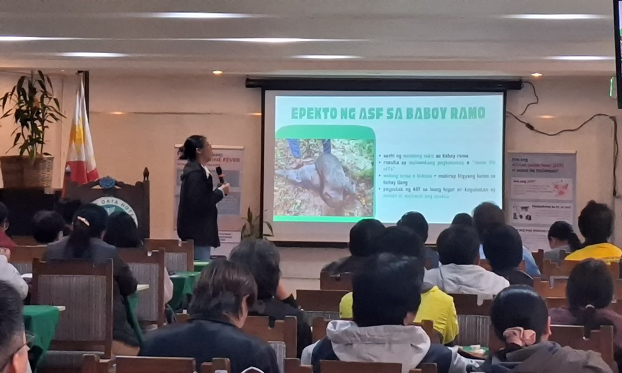 © FAO/Rizza Espenido | THE PHILIPPINES Raising awareness of ASF threats to wild pigs in Mountain Province In a bid to curb the spread of African swine fever (ASF) and protect both biodiversity and the livelihoods of rural communities, the Bureau of Animal Industry (BAI), Talarak Foundation Inc. and FAO held an awareness caravan from 26 to 28 November in the Mountain Province municipalities of Besao, Sagada and Bauko. Targeting the village biosecurity officers, hog raisers and hunters, the event provided updates on African swine fever (ASF) in the Philippines and its implications on both domestic and wild pigs. Participants discussed biosecurity measures, the importance of the Wildlife Conservation Act, and the need for conservation to safeguard livelihoods and biodiversity. Supported by the Republic of Korea’s Ministry of Agriculture, Food and Rural Affairs (MAFRA), the caravan reinforced the connection between wildlife protection and sustainable livestock management. |
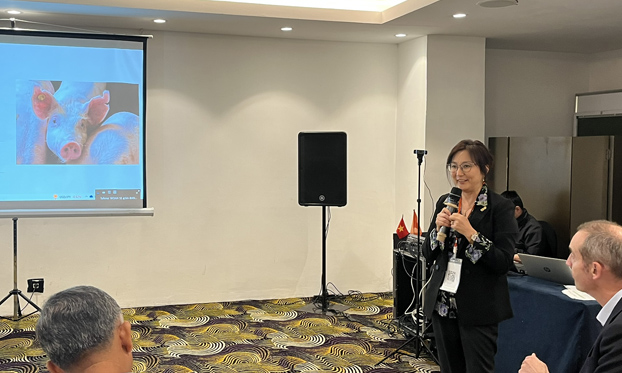 © WOAH | ASIA AND THE PACIFIC Empowering communities to combat ASF: ASEAN officials and experts convene in Hanoi The FAO-led Community African swine fever Biosecurity Intervention (CABI) took center stage during a meeting of Association of Southeast Asian Nations (ASEAN) experts in Hanoi, Viet Nam, from 26 to 28 November. FAO collaborated with the World Organisation for Animal Health (WOAH) to organize the event meant to advance the ASEAN ASF prevention and control strategy, focusing on implementation and monitoring. CABI, supported by USAID and the Republic of Korea, empowers smallholder farmers to adopt biosecurity measures to curb ASF spread. The programme has reached over 500 farmers, showcasing community-driven solutions' effectiveness in reducing disease impacts. Participants underscored collaboration among governments and organizations to combat ASF, which threatens food security and livelihoods. Integrating CABI into ASEAN’s strategy aims to strengthen regional resilience and sustainable disease prevention efforts. |
Learn more about our work on ASF here.
| |
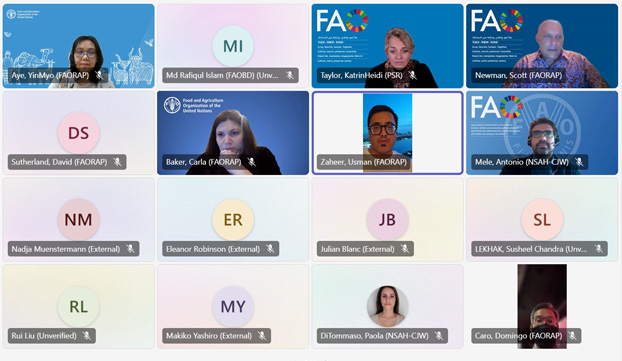 © FAO/Yin Myo Aye | ASIA AND THE PACIFIC Enhancing One Health collaboration in South Asia The Quadripartite, World Bank and Asian Development Bank convened virtually to strengthen One Health coordination in South Asia on 26 November. Discussions focused on creating a shared vision, sustainable financing strategies, and a collaborative framework to align efforts. The World Bank-FAO One Health investment planning approach in Bangladesh, Bhutan, and Sri Lanka was highlighted as a key initiative to advance regional collaboration and amplify impact in addressing health challenges at the human-animal-environment interface.
|
| Learn more about our work on One Health here. | |
